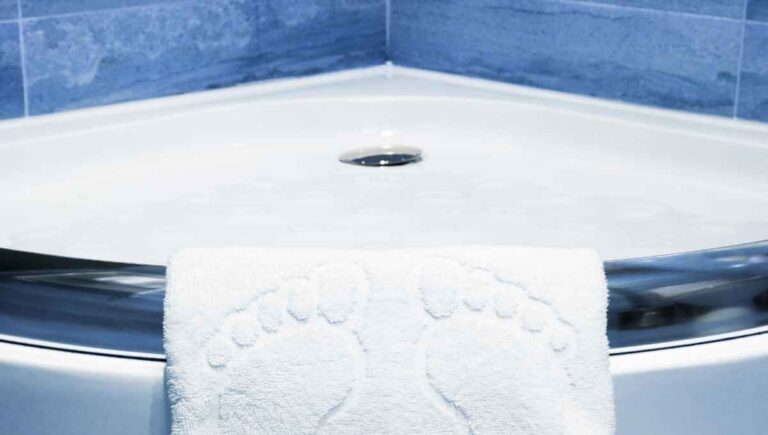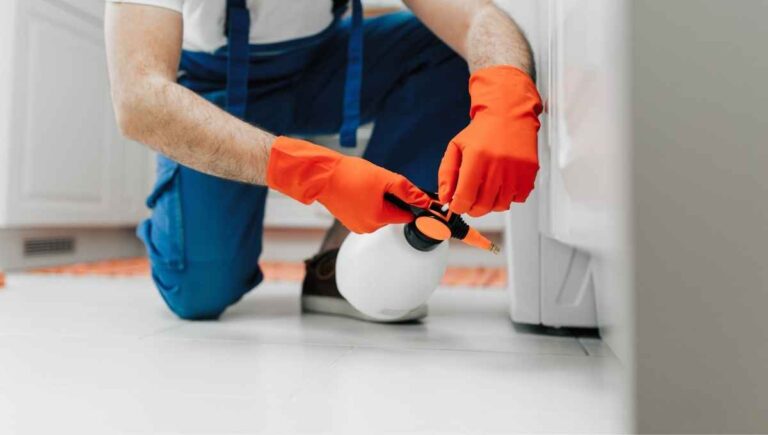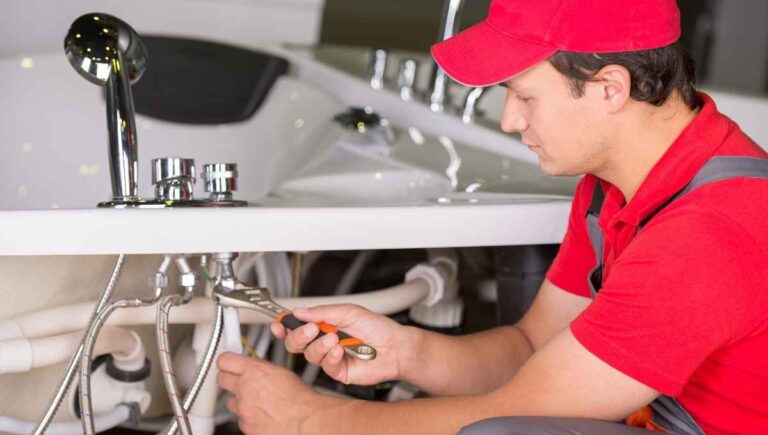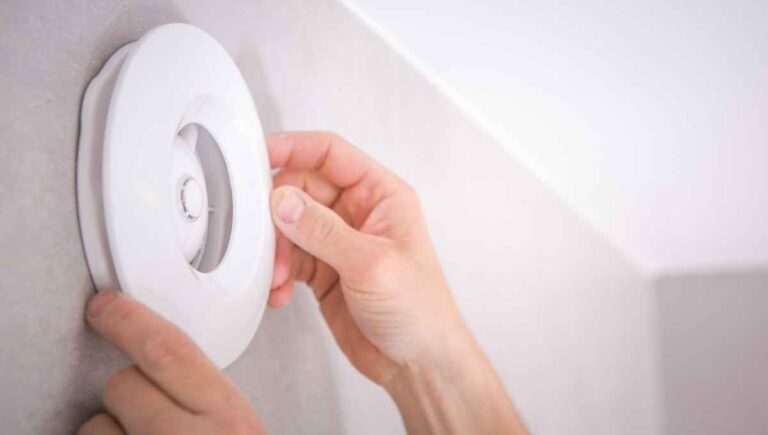Can You Leave a Fireplace Burning Overnight? (Expert Advice)
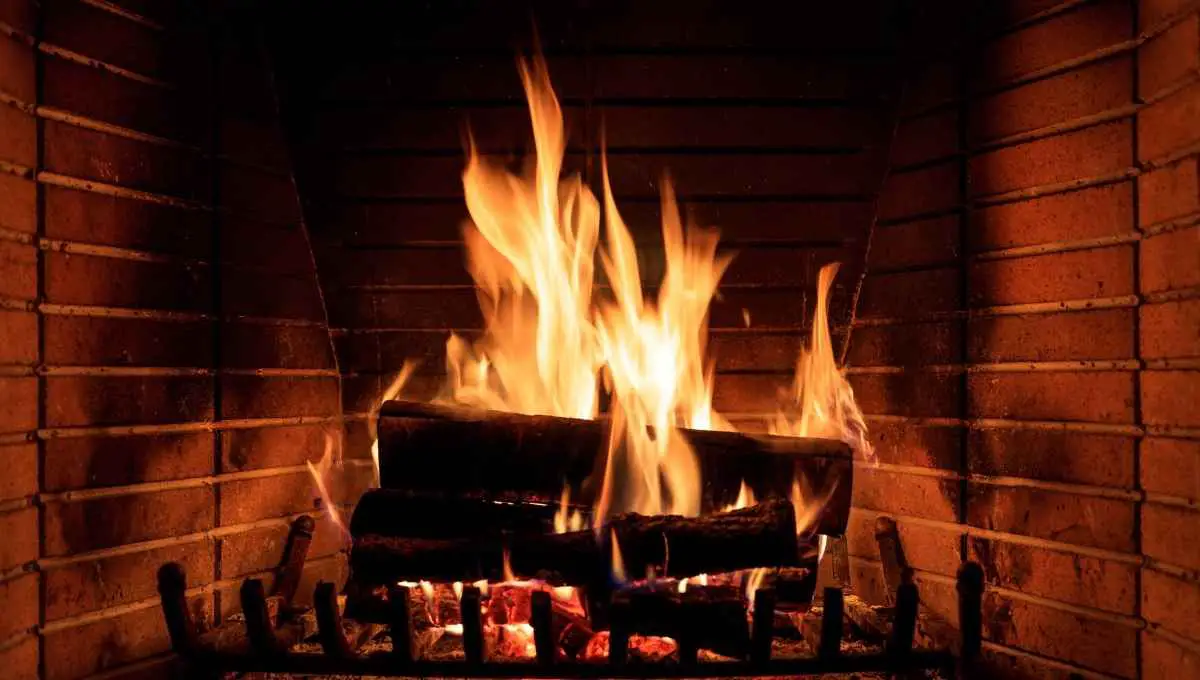
If you have a wood or gas-burning fireplace in your home, you’ve probably wondered about leaving it burning overnight. While it keeps the house nice and warm, you definitely don’t want to risk a fire! So, is it okay to leave a fireplace burning overnight?
You should never leave a fireplace burning overnight. Leaving a fireplace burning while you’re asleep could not only lead to an accidental fire but could also be fatal. It’s always best to extinguish any fires before going to bed. Remember, it only takes one ember to cause a fire!
There are lots of burning questions surrounding fireplaces. We’ve talked to the experts and gathered the best advice, so you know what’s safe and what you should avoid doing while your fire is going.
This post contains affiliate links. This means Household Blogger may earn a commission should you make a purchase using any of our links. Please refer to our full affiliate disclosure policy for full details.
Here’s a Quick Pro Tip!
Leaving your fireplace burning overnight is truly not a good idea. Instead, try using an extra warm blanket or space heater.
Here are some of our favorite cozy items from Amazon:
1. Electric Blanket – Both soft and warm, perfect for sleeping. And with an automatic shut-off, you don’t have to worry if you fall asleep with it on!
2. Space Heater – This oscillating space heater has an automatic 8-hour shut-off, allowing you to stay warm all night, and you don’t even have to worry about shutting it off in the morning!
3. Down Comforter – If you’re concerned about leaving anything running all night, consider this warm blanket to keep you comfy. No energy or electricity is required!
Overnight Burnout
Keeping your fire going overnight sounds tempting, but is it safe? We’ve talked to the experts, so you know what the best plan is for you and your fireplace.
Can You Leave a Fireplace Burning Overnight?
You should not be leaving your fireplace burning overnight, no matter what kind of fireplace you have. Leaving a fire unattended is very dangerous, and even if you think you’ve taken all the necessary precautions, you could end up ablaze.
It may sound drastic, but it only takes a small gust of wind and a spark for your fire to exit the fireplace.
From there, that small spark can set your whole room on fire before you’re even aware something has happened.
Is It Safe to Leave a Fireplace Burning Overnight?
It is not safe to leave a fireplace burning overnight. You should never leave any fire unattended, even if you think it’s contained. One slight breeze can lift embers and sparks.
This is true for any indoor fireplace, regardless of type and style. As long as there is fire, it’s possible for that fire to spread.
Make sure your fire is fully extinguished, and your fireplace is cold before going to bed.
Is It Safe to Leave Wood Fireplace Burning at Night?
You should never leave your wood-burning fireplace lit overnight. First, because it’s a significant fire hazard, but also because fire creates carbon monoxide, which is both colorless and odorless.
While carbon monoxide tends to be associated more with gas-burning fireplaces, any fire emits carbon monoxide.
If your fireplace vents are blocked or otherwise not functioning properly, carbon monoxide could be a silent killer.
Is It Safe to Leave Embers in a Fireplace Overnight?
You should not be leaving red hot embers burning in your fireplace overnight. While it may seem to be safe, it only takes a small gust of wind for your fire to reignite. This can lead to big problems!
Once your embers have cooled, it is okay to leave them overnight. Before building your fire, make sure you plan on staying with it until it dies out.
Don’t start a fire in your fireplace within an hour or two of when you plan on going to bed.
Is It Okay to Leave Gas Fireplace on Overnight?
We do not recommend leaving a fireplace burning overnight, regardless of whether it uses gas or wood for fuel. While some fireplaces are designed with a glass front panel to protect from sparks, that doesn’t make it safe.
All fireplaces emit some carbon monoxide. While your fireplace should have ventilation systems in place to prevent carbon monoxide from entering your home, it’s still best practice not to leave a fire unattended.
Do You Have to Put Out a Fire in a Fireplace at Night?
You should always put out any fire in your fireplace before you go to bed for the night. This prevents both fires and potential carbon monoxide concerns, which could both be deadly.
Before you retire for the evening, you should make sure that your fire has burned to ash, not just embers.
While those red hot coals may seem safe enough to leave, the right burst of wind can still reignite them, causing a fire.
How Do I Leave a Fireplace at Night?
When leaving your fireplace for the night, be sure to extinguish your fire fully. Also, be sure that your chimney’s flue has been left open. This allows air to circulate and prevents a build-up of carbon monoxide.
If your fireplace has glass panels at the front, make sure they are fully shut before you go to bed for the night.
That way, if a stray spark or ember does pop, it is less likely to catch outside of the fireplace and cause a house fire.
Should You Put Out Fireplace Before Bed?
We recommend that you always put out your fireplace before bed, no matter what kind of fireplace you’re utilizing. This prevents accidental carbon monoxide poisoning and accidental house fires.
If you’re unsure if your fireplace has been fully extinguished, consider using your fireplace poker to stir around the ashes.
If you can still see any red-hot embers, your fire is not fully extinguished and should not be left alone.
How Can I Stay Warm During the Night Without a Fire Going?
Keeping warm on a cold night is important, but so is extinguishing a fire before bed. Instead of relying on your fireplace to keep warm, consider other warm alternatives, like sweaters, blankets, and socks.
If you’re concerned that your house will cool down too much overnight, consider getting a space heater or using a heated blanket with an automatic shut-off instead.
These are both safer for you to be using overnight.
Carbon Monoxide Concerns
If you’ve been around a fireplace or open fire, you’re probably familiar with carbon monoxide. Because it’s colorless and odorless, carbon monoxide is a big concern.
We’ve gathered expert opinions, so you can be safe while your fireplace is on.
Can You Get Carbon Monoxide Poisoning From a Fireplace?
It is possible to get carbon monoxide poisoning from a fireplace. This is just one reason you should be having preventative maintenance performed on your fireplace and chimney by a trained professional.
If your ventilation systems are blocked or are not functioning properly, your fireplace will not be able to vent carbon monoxide efficiently.
This can lead to a build-up of carbon monoxide, which is very dangerous. If you have a fireplace, you should have a carbon monoxide detector.
Should You Open a Window When You Have a Fire in a Fireplace?
You do not have to have a window open while you’ve got a fire going in your fireplace as long as you have proper ventilation. However, it should not hurt your fire to have a window open, if you prefer.
Some suggest leaving the window open to help prevent carbon monoxide buildup. While this is good in theory, that’s what your ventilation system is for.
However, if you notice your room is getting a little smoky, you may want to open the window for clean air.
Can I Leave the Flue Open Overnight?
If you are concerned that your fire may not be fully extinguished or to help prevent carbon monoxide buildup, it is a good idea to leave your fireplaces flue open overnight.
Also, you should always have your flue, or damper, open when you start your fire to help prevent carbon monoxide buildup.
This is just one of the great tips provided by the City of Phoenix to enjoy your fireplace safely.
Is Fireplace Smoke Harmful?
According to the Environmental Protection Agency, fireplace smoke is not meant to be inhaled. It can contain fine particles that are hazardous to your health, even if you’re only burning wood.
Also, according to the EPA, too much wood smoke can trigger asthma, COPD, and other breathing-related attacks.
Always be sure your fireplaces flue or damper is at least partially open and that your ventilation systems are functioning properly.
Signs of Fire
If you’ve got a fire burning in your fireplace, you know to look out for excess smoke. But what do you do if your fire moves outside your fireplace? Stay safe with the tips we’ve gathered below!
What Are the First Signs of a Chimney Fire?
If you hear any loud cracking noises (imagine wood popping in the fireplace, but much, MUCH louder), your chimney may have caught fire. You may also notice an increase in heavy smoke or see fire coming out of the top of the chimney.
If you are ever concerned that your fireplace may be on fire, don’t hesitate to contact your local fire department. It can take less than five minutes for a room to be fully engulfed in flames.
What Damage Can a Chimney Fire Do?
If untreated, a chimney fire can do massive damage. While it’s possible for a small fire to occur, and you didn’t even realize it, a significant fire can lead to severe damage to the chimney lining and the interior masonry work.
In rare cases, an unstopped chimney fire can also spread fire from the chimney to the main house. Once the house sparks, fire can spread extremely quickly.
If you’re not sure if your chimney has caught fire, it’s always best practice to have it checked before you use the fireplace again.
How Likely Is a Chimney Fire?
Chimney fires typically start because of a buildup of soot and creosote in the interior of the chimney. Chimney fires happen approximately 25,000 times a year in the U.S. alone.
This buildup is the main reason you should have your chimney professionally cleaned.
Not only does it prevent that buildup from being able to form, but your chimney sweep can also tell you if there has been any damage to your fireplace.
Stopping Fire Before It Starts
While keeping your fire going all night may sound nice and toasty, it can lead to big problems if there is a fire. We’ve gathered some of the best tips to prevent you from having to deal with a chimney fire.
How Do You Put Out a Fire in a Fireplace Before Bed?
Before you start your fire, make sure only to use as much fuel as you’ll need before bedtime. When the fire is starting to die out, use your fireplace tools to spread out any extra fuel.
Once all visible flames have died out and you only have embers remaining, use your fireplace shovel to bury any red-hot embers. This helps to cool the embers more quickly.
Then, simply monitor the ashes for the next 15-20 minutes. Finally, stir the ash again to ensure the embers have cooled sufficiently before going to bed.
Will a Fire in a Fireplace Go Out on Its Own?
Any fire will eventually burn itself out without a fuel source. However, this doesn’t mean you can simply leave your fireplace burning overnight. Leaving a fire unattended is always dangerous and should not be done.
Leaving your fire unattended risks a fire occurring outside of the fireplace. It only takes one stray spark or a strong gust of wind for your small fire to become much larger.
Always extinguish a fire properly before leaving the room.
When Should You Close the Chimney After a Fire?
You can leave your fireplace damper or flue open overnight, even if the fire is out. This will help vent any excess carbon monoxide from the fire.
If you have a fire burning in your fireplace, you should always have the damper at least partially open. This not only allows your fire to have the necessary oxygen to burn but also prevents carbon monoxide buildup.
Should I Pour Water on Fireplace?
If you are just trying to put out your evening fire in your fireplace, you should avoid pouring water on it. Pouring water is ineffective. It adds a lot of smoke to your house and can even cause scald burns if you’re not careful.
Instead, when you’re ready to put out your fire for the evening, use your fireplace tools to spread out any remaining fuel.
Once the flames die out, bury the embers to help them cool more quickly. Water should be an emergency last resort only.
Related Questions
Can You Sleep With a Wood-Burning Stove on Overnight?
You can leave your wood-burning stove on overnight. If you are going to do so, make sure you’ve pulled the damper almost fully shut to prevent an over-abundance of oxygen, but don’t close it completely, to avoid a buildup of carbon monoxide.
Before leaving your stove overnight, ensure that anything flammable is well out of reach of the stove.
Make sure that no animals or humans are going to bump into it overnight accidentally. Additionally, make sure you’re having your chimney cleaned properly to prevent buildup.
How Long Can You Keep a Fire Going In a Fireplace?
A fire only needs fuel and oxygen to burn. As long as you provide both of these, your fire can burn indefinitely. Be sure to check with your chimney expert to ensure there are no restrictions on how long you can burn your fire.
If you are going to have a fire going on for more than a couple of hours at a time, make sure that your fireplace and chimney have been cleaned properly.
This prevents a buildup of soot and creosote and can help prevent a chimney fire.
Can a Fireplace Get Too Hot?
It is possible to overheat your fireplace. Typically this happens when you’ve added too much fuel at once. Just because your fireplace is large doesn’t mean the whole thing needs to be full of wood.
Overheating your fireplace can cause the outer walls to weaken or warp, which may lead to uncontrolled fires or the disintegration of your fireplace.
If you think your fireplace is getting too hot, stir and bury what you can with the cooler ash and spread out the fuel as much as you can.
Final Thoughts
A fireplace is hands down one of the coziest ways to stay warm on a cold night. That being said, when you’re ready to go to bed, make sure your fire has been fully extinguished.
Better to be a little chilly than to worry about fire and carbon monoxide poisoning! We hope the ideas in this article help you stay warm and safe during your next fire.




